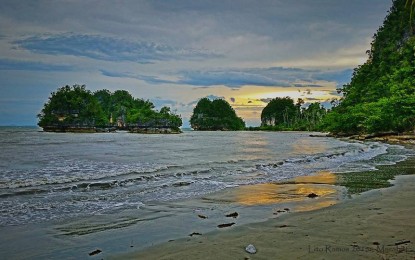
RED TIDE-HIT. A portion of San Pedro Bay in Samar province. Red tide remains in Irong-Irong and San Pedro Bays in Samar province more than a month after the two bays turned positive for paralytic shellfish poisoning (PSP) toxin, the Bureau of Fisheries and Aquatic Resources (BFAR) reported on Wednesday (Dec. 28, 2022). (File photo)
TACLOBAN CITY – Red tide remains in Irong-Irong and San Pedro Bays in Samar province more than a month after the two bays turned positive for paralytic shellfish poisoning (PSP) toxin, the Bureau of Fisheries and Aquatic Resources (BFAR) reported on Wednesday.
Citing the latest laboratory results, BFAR said the presence of toxic red tide in both seawater and shellfish meat is still beyond the regulatory limit.
“All types of shellfish and Acetes sp. or alamang or hipon gathered from these bays are not safe for human consumption,” the BFAR said in its advisory.
Irong-Irong Bay is located in Catbalogan City, the capital of Samar province while San Pedro Bay is situated in the towns of Basey, also in Samar.
The two bays are included in the national shellfish bulletin issued by the BFAR central office.
Local red tide advisories are still in place within Matarinao Bay in General MacArthur, Hernani, Quinapondan and Salcedo, Eastern Samar; Cancabato Bay in Tacloban City and coastal waters of Guiuan in Eastern Samar due to the presence of pyrodinium bahamense, a toxic microorganism that causes PSP.
The BFAR regional office here is still waiting for confirmatory test results from the BFAR National Fisheries Laboratory.
“To safeguard human lives, a local red tide warning is issued in this area as a precautionary advice to the public to refrain from gathering, selling, and eating all types of shellfishes from the said bay,” BFAR added.
Fish, squid, crab and shrimp gathered from these areas are safe to eat provided that all entrails are removed and the marine products are washed thoroughly with running water before cooking.
The BFAR asked local government units to heighten their watch against the gathering, trading and consumption of shellfish to prevent the incidence of PSP which can occur minutes after ingesting bivalve shellfish (such as mussels, oysters, and clams) that contain red tide toxins.
Early PSP symptoms include tingling of the lips and tongue and may progress to tingling of fingers and toes and then loss of control of arms and legs, followed by difficulty in breathing.
Red tide is a term used to describe a phenomenon where the water is discolored by high algal biomass or a high concentration of algae. (PNA)
